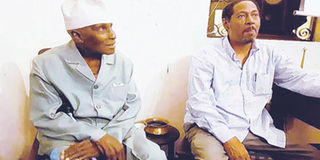Haji Gora: Z’bar's versatile artist

Author of the book on the life of Mzee Haji Gora (left), Mr Ally Saleh, poses with the famous artist in Zanzibar recently. PHOTOS | THE CITIZEN CORRESPONDENT
What you need to know:
As opposed to many composers who favour love songs, Mzee Gora is different. He says he is interested in issues surrounding human life besides love. One might take him for some sort of an activist as most of his songs are politically oriented and motivated.
Zanzibar. He has not seen inside of a classroom but he has authored nine books and more than 500 songs. Some of the songs have been performed by famous taarabu groups and singers in Zanzibar. This is Mzee Haji Gora, a resident of Tumbatu islet in northern Unguja.
To many people education is the most valuable thing. Without it one is not expected to make great things. An uneducated person is usually looked down on by other members of the public, especially those who have attained some level of education.
Even when an uneducated person gives an opinion on an issue, people tend to ignore it even if it makes great sense.
But Mzee Gora is among the people who have proved detractors wrong.
He is an achiever and is highly respected although he has not gone to school. Actually, he can beat many educated people in art. He is a composer, poet and creative writer.
He has written nine books andcomposed taarabu songs and poems.
Many people have likened him to Fatma Baraka, popularly known as Bi Kidude — the legendary taarabu — who excelled in music although she was not formally educated.
She could memorise songs and singing them without missing a word. She was called the ‘Taarabu Queen’. When she died on July 17, 2013, she was mourned locally and abroad.
The difference between Bi Kidude and Mzee Gora is that the former sang songs which were composed by other artistes. Mzee Gora composes songs that are sung by other people.
Books and beginning
The Ministry of Education has approved one of his books, titled ‘Kimbunga’, for advanced level studies in Kiswahili.
The other titles include ‘Siri ya Giningi’, ‘Utenzi wa Nabii Daudi’, ‘Hadithi za Watoto’ and a dictionary on Tumbatu dialects.
Mzee Gora started to compose songs for traditional dances when he was young on Tumbatu islet.
He later shifted to Unguja Town where he performed with various traditional dance groups between 1940s and 1960s.
He composed songs for taarabu groups as well as the famous Zige traditional dance.
Later, he learnt how to compose modern poems, under the tutelage of Bakari Abeid —a celebrated composer and taarabu singer in Zanzibar.
It was when he learnt modern guidelines on how to use metre and rhyme.
Mzee Gora said it was not hard for him to learn the new techniques because he had the basics.
“It was not very hard for me to learn because I left Tumbatu with skills on how to compose poems. But I was doing it for traditional dances, therefore I came to town to learn how to compose modern poems using metre and rhyme,” he told The Citizen at his home.
After learning the new tactics, his songs attracted more taarabu groups. Radio stations have been playing some of his songs.
Groups that hired Mzee Gora to compose songs include Mlandege, Mwembetanga, Yaso, Culture and Akhwan Safaa based in Malindi. Mzee Gora became popular.
Politics
‘Mpewa Hapokonyeki’ is one of his songs sang by Mwanahawa Ali of Culture Musical Club based in Malindi. Although he composed it many years ago, it has become famous in recent years as it is being used in politics. Radio and television stations play it a lot, especially during election times.
Politicians use its message to brag against their rivals that ‘what has been endowed to them can never be taken away’. This is especially when someone had won an election.
Usually Chama Cha Mapinduzi (CCM) supporters use it to chide opposition Civic United Front (CUF) secretary general Seif Sharif Hamad, whose bid for presidency has been flopping each election year.
Although originally Mzee Gora did not compose it for that purpose, he can do nothing to change how people interpret it.
In the beginning, he says, it was not that popular. But it attracted the attention of politicians on the onset of multiparty politics.
It was used in the 1995 election which Dr Salmin Amour Juma became president.
CCM also used it in 2005 when Abeid Aman Karume defeated CUF and in 2016 when Dr Ali Mohammed Shein won the Isles presidency on a CCM ticket.
Emarson Foundation chairman Said Nassor Al Ghaithiy says before his death, Mr Emarson instructed his assistants that his institution should take care of treasured artists like Bi Kidude and Mzee Gora for their immense contribution to the development of Zanzibari culture.
Al Ghaithiy notes that Mzee Gora has dedicated his life and talent for the development of art and culture in Zanzibar. In doing so, he says, Mzee Gora has contributed a lot in the development of Kiswahili, even as he did not study the language formally in school.
“The Emarson Foundation has decided to safeguard these artists’ works and we would like to congratulate them for the huge responsibilities they have taken to improve our national language, Kiswahili. Despite advancing age of Mzee Gora, we still aspire to develop his talents. He has done a lot in developing art in the country,” he says.
Love songs
As opposed to many composers who favour love songs, Mzee Gora is different. He says he is interested in issues surrounding human life besides love. One might take him for some sort of an activist as most of his songs are politically oriented and motivated.
He says he loves to compose songs about politics. He also likes to criticise the government when it does things he does not agree with.
He has also composed many songs on social issues including health and education.
When the country was contemplating to re-introduce multiparty politics system in early 1990s, Mzee Gora composed a song warning about the repercussions of the new system. All this does not mean Mzee Gora was not totally fond of love songs. His compositions somehow gave people a hard time to correctly interpret.
“I think I have done my work better but a song called ‘Kitendawili’ is among compositions which I consider as my masterpieces. Many people ask me why I composed a song that many people found difficult to interpret, I always tell them that that was what literature was all about,” he says.
‘Kitendawili’ was sung by the late Seif Salim of Malindi-based Akhwan Safaa.
Mzee Gora challenges up and coming artists to work hard and maintain discipline. He says by doing so, they will not only assure them of respect and income, but it will enable them to work for a long time without losing public appeal.
“Artists will gain and command respect and public support only if they exercise high level of hard work and maintain discipline in what they do,” he says.
Mzee Gora says many artists work hard but they are impatient. Many of them expect to reap immediately after they start working.
“They should be patient. Some things take years to bring results. Many people do not persevere because they expect to start working today and reap benefits tomorrow,” he adds.
He urges composers of songs to first learn what the public wants. They should then learn how to compose and present what the public wants.
“Another important thing to remember among artists, especially the young ones, is that they should work not expecting a reward. They should not even expect fame from what they do. These things come automatically once you have mastered the art of presenting to the public what the public desires,” he says.
He says artists should not waste their time working for short-lived fame. Rather they should aim for quality because if someone does a good job, people will appreciate it and remember the artist for years even after his or her death.
A book on his life
Given Mzee Gora’s contribution to development of literature and art, a famous author and politician here, Mr Ally Saleh, who is also the Malindi MP on a CUF ticket, has written a book about him.
The book was launched recently during the last edition of Zanzibar International Film Festival.
In the book, Mr Saleh outlines the entire life of Mzee Gora, since he was born in Tumbatu, his early days, his youth and his work.
Speaking during the launch, Mr Saleh said he wrote the book to enable more people to comprehend work done by Mzee Gora.
He since the book will be read by many people, including those outside Zanzibar, Mzee Gora’s works will be known to many people.
He says the book also aims at keeping memory of how people like Mzee Gora have made contributions in transforming and upholding Zanzibar culture.
“Life of Mzee Gora is a big lesson to many people. He did not acquire formal education but he has accomplished many things in literature, culture and arts. This should teach people that although we value education but going to school is not everything. People can accomplish what they have through other means including informal schooling,” he says.
Mr Saleh noted that many PhD holders they have not contributed even half of what Mzee Gora has contributed in Zanzibar. He notes that such people could not be compared with ‘uneducated’ Mzee Gora.
The book launch was sponsored by Emarson Skeens Fund, formed by a US resident who died last year after spending a good part of his life in Zanzibar. He worked closely with Bi Kidude, Mzee Gora and other artists.
Mr Saleh says the book is his contribution in honouring Mzee Gora and keeping his works alive. In the book he discribes Mzee Gora as one of proficient writers and composers who, though he has not seen inside of a classroom, he mastered the art of composing poems and songs which later became popular and contributed to improve culture.
Mr Saleh said in his work as an author, he has not written a book on a better Zanzibar artist than Mzee Gora. He said while other composers based on love songs, Mzee Gora was different as he touched on issues which had wider public interest as they concern everyday lives of many people.
“We must appreciate the works done by people such as Mzee Gora; they must be treasured. Their contribution in the country cannot be equated to anything. They dedicated their lives and talents in serving the nation and we must pay them back by valuing what they have done.”


